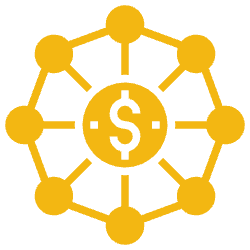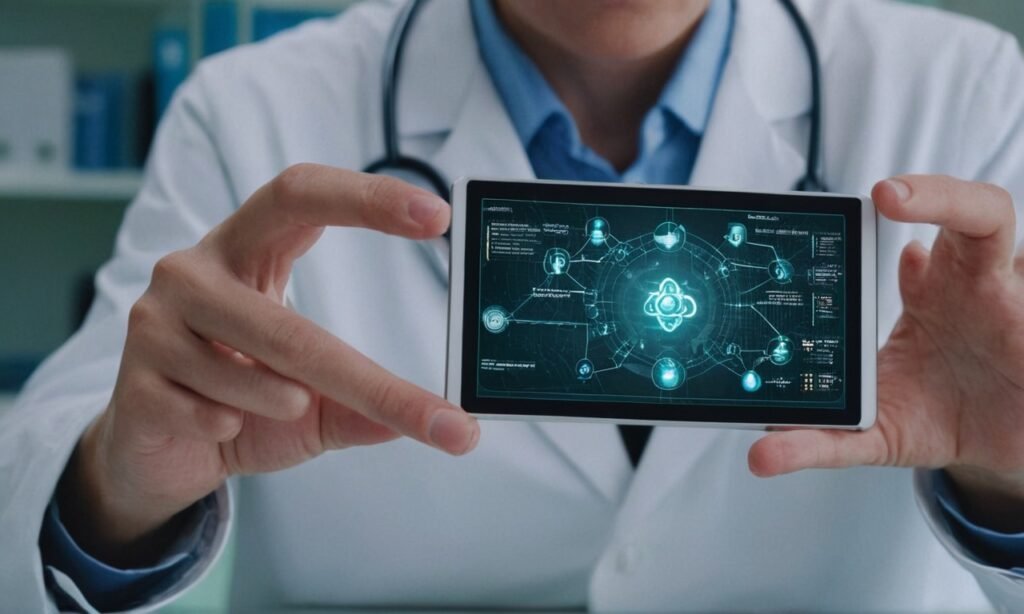Discover how blockchain technology is transforming healthcare by enhancing patient data security and improving efficiency. Explore the benefits, challenges, and future potential of integrating blockchain in healthcare systems.
Introduction
In a world where data breaches are as common as a cold, healthcare systems are in dire need of robust security measures. Enter blockchain, the revolutionary technology that’s been making waves in various industries, from finance to supply chain management. But did you know that blockchain could be a game-changer for healthcare too? That’s right! Blockchain and healthcare, when combined, hold the promise of improving patient data security and efficiency, ensuring that your medical information is as safe as your secret chocolate stash.
Let’s dive into how this dynamic duo works, the potential benefits, and the challenges that come with it.
What is Blockchain, Anyway?
Before we get ahead of ourselves, let’s break down what blockchain is. Picture a digital ledger that’s decentralized and distributed across multiple computers. Each transaction or data entry is a “block” that’s linked to the previous one, forming a “chain.” This setup makes it incredibly difficult for anyone to tamper with the data, as altering one block would mean changing all the subsequent ones across every computer in the network. Pretty nifty, huh?
Key Features of Blockchain
- Decentralization: No single point of failure
- Transparency: Every participant can view the transactions
- Immutability: Once recorded, data can’t be altered
- Security: Strong encryption and consensus mechanisms
Why Blockchain in Healthcare?
So, why should we care about blockchain in healthcare? Well, the healthcare industry is notorious for its fragmented data systems. Patient records are scattered across various platforms, making it a nightmare for doctors to get a comprehensive view of a patient’s medical history. This not only hampers efficiency but also poses serious security risks. Here’s where blockchain comes to the rescue!
Enhancing Patient Data Security
With blockchain, patient data can be securely stored and shared among authorized parties without the risk of unauthorized access. Each transaction is encrypted and requires consensus from the network before being added to the blockchain, ensuring data integrity. Plus, since the data is decentralized, there’s no single point of failure. Hackers would have to breach multiple systems simultaneously—a nearly impossible feat.
Improving Efficiency
Imagine a world where you don’t have to fill out the same medical forms every time you visit a new doctor. With blockchain, your medical history is accessible to any authorized healthcare provider, making the process smoother and quicker. This not only saves time but also reduces administrative costs, allowing healthcare professionals to focus more on patient care rather than paperwork.
Real-World Applications of Blockchain in Healthcare
Blockchain isn’t just a buzzword; it’s already making a tangible impact in healthcare. Let’s look at some real-world applications that are revolutionizing the industry.
Secure Medical Records
One of the most promising uses of blockchain is the secure management of electronic health records (EHRs). Companies like Medicalchain and Guardtime are developing blockchain-based platforms that allow patients to control who has access to their medical records. Patients can grant or revoke access in real-time, ensuring their privacy is always maintained.
Drug Supply Chain Management
Counterfeit drugs are a massive problem, costing the industry billions and putting patients’ lives at risk. Blockchain can track the entire lifecycle of a drug, from manufacturing to the pharmacy shelf, ensuring its authenticity. IBM’s blockchain solution, in collaboration with the FDA, aims to create a safer drug supply chain by improving traceability and reducing fraud.
Clinical Trials
Clinical trials are essential for developing new treatments, but they often suffer from data manipulation and lack of transparency. Blockchain can provide a tamper-proof record of all trial data, ensuring its accuracy and credibility. This can speed up the approval process for new drugs and treatments, ultimately benefiting patients.
Health Insurance Claims
Blockchain can streamline the often cumbersome process of health insurance claims. By automating verification and reducing the potential for fraud, blockchain can ensure that claims are processed more quickly and accurately. This not only benefits patients but also reduces administrative costs for insurers.
Overcoming Challenges in Blockchain Adoption
While the potential of blockchain in healthcare is immense, it’s not without its hurdles. Here are some challenges that need to be addressed for widespread adoption.
Regulatory Compliance
Healthcare is one of the most heavily regulated industries. Ensuring that blockchain solutions comply with regulations like HIPAA (Health Insurance Portability and Accountability Act) in the U.S. is crucial. This requires close collaboration between blockchain developers and regulatory bodies.
Integration with Existing Systems
Most healthcare systems are built on legacy technologies. Integrating blockchain with these existing systems can be complex and costly. However, with the right approach, it can be done incrementally, ensuring a smooth transition.
Data Privacy Concerns
While blockchain enhances data security, it also raises concerns about data privacy. Ensuring that patient data is anonymized and that only authorized parties have access is essential. Solutions like zero-knowledge proofs and private blockchains can help address these concerns.
Scalability
Blockchain networks can sometimes struggle with scalability, especially when dealing with large volumes of data. However, advancements in blockchain technology, such as sharding and off-chain solutions, are continually improving scalability.
Future of Blockchain in Healthcare
The future looks bright for blockchain in healthcare. As technology evolves and more stakeholders recognize its potential, we can expect to see even more innovative applications. Here are some future trends to watch out for.
Personalized Medicine
Blockchain can enable more personalized and precise treatments by securely sharing patient data across various healthcare providers. This can lead to better diagnosis and tailored treatments, improving patient outcomes.
Interoperability
Achieving interoperability among different healthcare systems is a significant challenge. Blockchain can serve as a universal standard for data exchange, ensuring seamless communication and collaboration among healthcare providers.
Patient Empowerment
Blockchain puts patients in control of their health data. They can decide who gets access to their information and can even monetize their data by participating in research studies or selling anonymized data to pharmaceutical companies.
Global Health Initiatives
Blockchain can facilitate global health initiatives by ensuring transparent and secure data sharing among international organizations. This can improve responses to pandemics, track disease outbreaks, and streamline international aid efforts.
FAQs
How does blockchain improve patient data security?
Blockchain improves patient data security by encrypting each transaction and requiring network consensus before adding it to the blockchain. This ensures data integrity and prevents unauthorized access.
What are some real-world applications of blockchain in healthcare?
Real-world applications of blockchain in healthcare include secure medical records, drug supply chain management, clinical trials, and health insurance claims.
What challenges does blockchain face in healthcare adoption?
Challenges include regulatory compliance, integration with existing systems, data privacy concerns, and scalability issues.
What is the future of blockchain in healthcare?
The future of blockchain in healthcare includes trends like personalized medicine, interoperability, patient empowerment, and global health initiatives.
Conclusion
Blockchain and healthcare: improving patient data security and efficiency is not just a futuristic concept but a reality that’s unfolding before our eyes. By enhancing data security, improving efficiency, and offering innovative applications, blockchain has the potential to revolutionize the healthcare industry. While challenges exist, the benefits far outweigh the hurdles. As we move forward, it’s exciting to imagine a healthcare system where data is secure, processes are efficient, and patients are empowered. Blockchain is the key to making this vision a reality. So, buckle up

